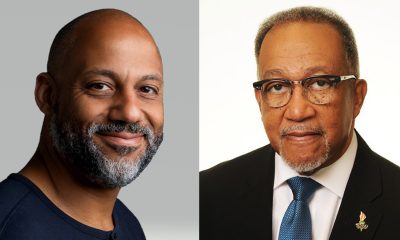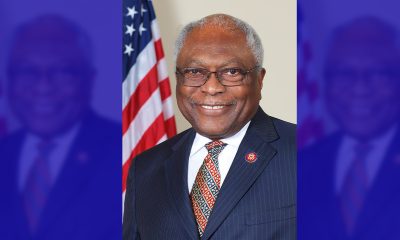Politics
FACT CHECK: Rubio Rhetoric Breaks with Past, but Ideas Don’t

Republican presidential candidate Sen. Marco Rubio, R-Fla., discusses their recently released tax reform plan, Wednesday, April 15, 2015, at the Heritage Foundation in Washington. (AP Photo/Molly Riley)
STEVE PEOPLES, Associated Press
WASHINGTON (AP) — Florida Sen. Marco Rubio launched a Republican presidential campaign this week with a promise to reject “the leaders and ideas of the past.”
It was a not-so-subtle jab from a 43-year-old fresh-faced, senator at his likely 2016 competitors, Republican Jeb Bush and Democrat Hillary Clinton, whose families were cemented as political dynasties in the 1990s. A closer look at Rubio’s early priorities, however, suggests that many of his policy prescriptions were born in the same era he’s vowing to leave behind.
Moreover, he confused his opening argument by comparing today’s taxes and government spending to 1999, the year Bush took office as Florida governor and Bill Clinton was president.
A look at a few facts behind his rhetoric:
RUBIO: “Too many of our leaders and their ideas are stuck in the 20th century.”
THE FACTS: On foreign policy, taxes and government spending, many of Rubio’s policies are rooted in Republican positions from the 1990s or even earlier.
Foreign policy stands out in particular for Rubio, who embraces the same muscular approach that dominated the Reagan and last Bush administrations.
While some conservatives now favor a reduced international footprint, Rubio has shown an appetite for pre-emptive military action against the Islamic State group and has not ruled out ground forces. He has also become Congress’ leading opponent of Obama’s plans to normalize relations with Cuba. The senator said in a Tuesday interview that the United States should not open an embassy on the island and should continue its longstanding policy that has isolated Cuba since the early 1960s.
On spending, Rubio has repeatedly endorsed a constitutional amendment to balance the federal budget. Republican calls for such an amendment persisted throughout the Clinton years in the late 1990s after being embraced by President Ronald Reagan in the 1980s.
Rubio is also calling for sweeping changes to entitlement programs such as Medicare and Social Security to control government spending. While the push for “premium supports” to control Medicare costs was born this century, pieces of Rubio’s plans to change Social Security are decades old. Specifically, he would repeal the “earnings test” for anyone who claims Social Security before full retirement age but keeps working.
The GOP’s 1992 platform outlined the same position. Rubio also wants to raise the retirement age, something George W. Bush suggested as a presidential candidate before the 2000 election.
On taxes, Rubio recently proposed a comprehensive plan that would maintain a 35-percent rate for top earners, but reduce taxes on corporations and eliminate the capital gains tax altogether. He departs from a long-held GOP position that the rate for top earners should be lower. But calls for reduced corporate and capital gains taxes dominated the GOP’s tax platform throughout the 1990s.
On education, Rubio says the nation needs “a 21st century approach” to education. He supports an expansion of digital and online courses as part of a larger focus on school choice. The technology may be new, but calls for school choice are not. Republicans throughout the 1990s wanted to give parents more educational choices.
Rubio this week said more high school students need to graduate “ready to work” in jobs such as mechanics, plumbers and welders. For decades, political leaders — including Jeb Bush during his time as Florida governor — have promoted stronger vocational education.
___
RUBIO: “Our leaders put us at a disadvantage by taxing, borrowing and regulating like it’s 1999.”
THE FACTS: While Rubio was surely trying to have fun with a popular Prince song, he’s wrong to liken the government’s current taxing and borrowing to that of 1999.
The nation’s national debt was in far better shape at that time, when the federal government carried budget surpluses during the final years of the Clinton presidency. Taxes were far higher in 1999 as well. Tax revenues then exceeded 19 percent as a percentage of the gross domestic product compared with 17.5 percent in 2014, according to the Congressional Budget Office. Today’s lower taxes come from Bush-era tax cuts and President Barack Obama’s decision to extend them permanently.
Copyright 2015 The Associated Press. All rights reserved. This material may not be published, broadcast, rewritten or redistributed.
Activism
Oakland Post: Week of April 24 – 30, 2024
The printed Weekly Edition of the Oakland Post: Week of April 24 – 30, 2024

To enlarge your view of this issue, use the slider, magnifying glass icon or full page icon in the lower right corner of the browser window. ![]()
Bay Area
MAYOR BREED ANNOUNCES $53 MILLION FEDERAL GRANT FOR SAN FRANCISCO’S HOMELESS PROGRAMS
San Francisco, CA – Mayor London N. Breed today announced that the U.S. Department of Housing and Urban Development (HUD) has awarded the city a $53.7 million grant to support efforts to renew and expand critical services and housing for people experiencing homelessness in San Francisco.

FOR IMMEDIATE RELEASE:
Wednesday, January 31, 2024
Contact: Mayor’s Office of Communications, mayorspressoffice@sfgov.org
***PRESS RELEASE***
MAYOR BREED ANNOUNCES $53 MILLION FEDERAL GRANT FOR SAN FRANCISCO’S HOMELESS PROGRAMS
HUD’s Continuum of Care grant will support the City’s range of critical services and programs, including permanent supportive housing, rapid re-housing, and improved access to housing for survivors of domestic violence
San Francisco, CA – Mayor London N. Breed today announced that the U.S. Department of Housing and Urban Development (HUD) has awarded the city a $53.7 million grant to support efforts to renew and expand critical services and housing for people experiencing homelessness in San Francisco.
HUD’s Continuum of Care (CoC) program is designed to support local programs with the goal of ending homelessness for individuals, families, and Transitional Age Youth.
This funding supports the city’s ongoing efforts that have helped more than 15,000 people exit homelessness since 2018 through City programs including direct housing placements and relocation assistance. During that time San Francisco has also increased housing slots by 50%. San Francisco has the most permanent supportive housing of any county in the Bay Area, and the second most slots per capita than any city in the country.
“In San Francisco, we have worked aggressively to increase housing, shelter, and services for people experiencing homelessness, and we are building on these efforts every day,” said Mayor London Breed. “Every day our encampment outreach workers are going out to bring people indoors and our City workers are connecting people to housing and shelter. This support from the federal government is critical and will allow us to serve people in need and address encampments in our neighborhoods.”
The funding towards supporting the renewal projects in San Francisco include financial support for a mix of permanent supportive housing, rapid re-housing, and transitional housing projects. In addition, the CoC award will support Coordinated Entry projects to centralize the City’s various efforts to address homelessness. This includes $2.1 million in funding for the Coordinated Entry system to improve access to housing for youth and survivors of domestic violence.
“This is a good day for San Francisco,” said Shireen McSpadden, executive director of the Department of Homelessness and Supportive Housing. “HUD’s Continuum of Care funding provides vital resources to a diversity of programs and projects that have helped people to stabilize in our community. This funding is a testament to our work and the work of our nonprofit partners.”
The 2024 Continuum of Care Renewal Awards Include:
- $42.2 million for 29 renewal PSH projects that serve chronically homeless, veterans, and youth
- $318,000 for one new PSH project, which will provide 98 affordable homes for low-income seniors in the Richmond District
- $445,00 for one Transitional Housing (TH) project serving youth
- $6.4 million dedicated to four Rapid Rehousing (RRH) projects that serve families, youth, and survivors of domestic violence
- $750,00 for two Homeless Management Information System (HMIS) projects
- $2.1 million for three Coordinated Entry projects that serve families, youth, chronically homeless, and survivors of domestic violence
In addition, the 2023 CoC Planning Grant, now increased to $1,500,000 from $1,250,000, was also approved. Planning grants are submitted non-competitively and may be used to carry out the duties of operating a CoC, such as system evaluation and planning, monitoring, project and system performance improvement, providing trainings, partner collaborations, and conducting the PIT Count.
“We are very appreciative of HUD’s support in fulfilling our funding request for these critically important projects for San Francisco that help so many people trying to exit homelessness,” said Del Seymour, co-chair of the Local Homeless Coordinating Board. “This funding will make a real difference to people seeking services and support in their journey out of homelessness.”
In comparison to last year’s competition, this represents a $770,000 increase in funding, due to a new PSH project that was funded, an increase in some unit type Fair Market Rents (FMRs) and the larger CoC Planning Grant. In a year where more projects had to compete nationally against other communities, this represents a significant increase.
Nationally, HUD awarded nearly $3.16 billion for over 7,000 local homeless housing and service programs including new projects and renewals across the United States.
Activism
Oakland Post: Week of April 17 – 23, 2024
The printed Weekly Edition of the Oakland Post: Week of April 17 – 23, 2024

To enlarge your view of this issue, use the slider, magnifying glass icon or full page icon in the lower right corner of the browser window. ![]()
-

 Activism4 weeks ago
Activism4 weeks agoOakland Post: Week of March 27 – April 2, 2024
-

 #NNPA BlackPress4 weeks ago
#NNPA BlackPress4 weeks agoBeloved Actor and Activist Louis Cameron Gossett Jr. Dies at 87
-

 Community1 week ago
Community1 week agoFinancial Assistance Bill for Descendants of Enslaved Persons to Help Them Purchase, Own, or Maintain a Home
-

 Activism3 weeks ago
Activism3 weeks agoOakland Post: Week of April 3 – 6, 2024
-

 Business1 week ago
Business1 week agoV.P. Kamala Harris: Americans With Criminal Records Will Soon Be Eligible for SBA Loans
-

 Activism2 weeks ago
Activism2 weeks agoOakland Post: Week of April 10 – 16, 2024
-

 Community1 week ago
Community1 week agoAG Bonta Says Oakland School Leaders Should Comply with State Laws to Avoid ‘Disparate Harm’ When Closing or Merging Schools
-

 Community6 days ago
Community6 days agoOakland WNBA Player to be Inducted Into Hall of Fame

























































